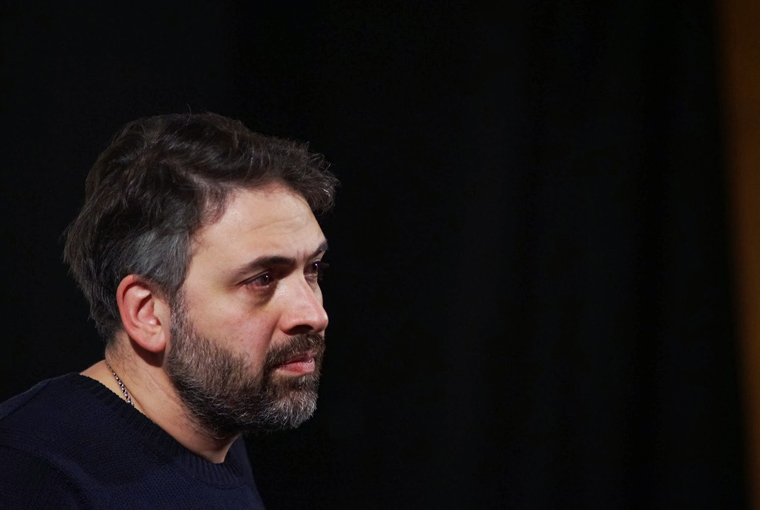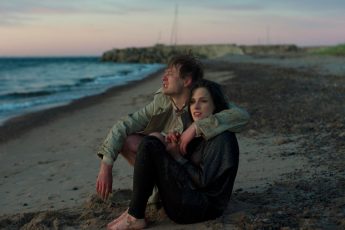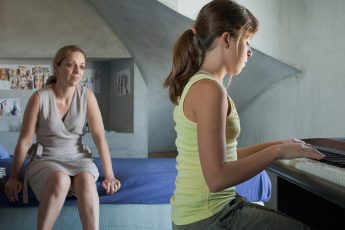
Konstanty Kuzma met Georgian director Levan Koguashvili during the Berlinale (February 6-16) where his second feature “Blind Dates” screened in the Forum section of the festival. Koguashvili speaks about the themes of his films, their ethical implications, and comedic intentions.
What is it that motivates your fascination with revealing the virtues of people who are victimized and rejected by society? In “Street Days”, “Women from Georgia” and “Blind Dates”, the protagonists face great social distress…
When people are experiencing problems, they’re in an interesting state. We’re talking about social or life situations which are interesting to see on screen – you have drama. In Women from Georgia, life is both dramatic and cinematic. These women in the US bring up their kids in Georgia via telephone, teaching them songs and prayers this way. Plus, I thought that as a Georgian who belongs to this culture, I have a responsibility to depict the life that is part of my country.
The same goes for Street Days. I thought that this drug theme is a very good excuse to show the “lost generation” problem. It was not a film about drugs per se. These people attempted to legitimize their lives by imitating life through drug possession: they perform all day – acting tough, cheating each other, complaining. It’s a profession. Drugs really were a huge problem for my generation – so many great people died. Drugs were a tool which generated cinematic situations and allowed me to depict this problem.
But that’s not all you do – as your films illustrate, your protagonists are kinds of people who are not accepted by society. Was it important to reveal their humanity, too?
To me, it doesn’t make sense to make films about uninteresting people. Depicting a junkie with dignity is both interesting and closer to reality. I know so many nice people who suffered from drugs. It’s not so simple to form an informed judgement. I feel sorry for them for wasting their lives. Showing this sort of dignity on screen is important. Movies have to give you some sort of example for decent behavior. It’s not just about showing reality, which is tough and frustrating and all that.
I read an interview with Cassavetes where he says how showing reality isn’t enough. It’s tough, but so what? If you just show that you devastate. You need to leave open a little door of escape from this reality. You can show reality without knowing what to do about it.
Of course this is difficult to judge, but I had the impression that Georgian viewers had more trouble laughing at the film [“Blind Dates”] during yesterday’s screening than local ones, which got me thinking whether there is in fact something about the film that Georgian audiences should find funny: there are few funny dialogues, the humor being more character-driven and situational and thus not straightforwardly comedic. Did you have the intention of making a comedy?
No, I never wanted to make a pure comedy. I wanted to make the film funnier than what my generation has been doing, including myself. I thought that we’re going a little too far with these dark movies. But this has a lot to do with reality again because Georgian life doesn’t only consist of dark sides. People keep living, they have humor. Comedy and tragedy are always mixed. Good filmmaking is always about showing comedy on screen, even in tragedies. I just mentioned Cassavetes – what does he do? Tragedies as comedies. So that’s what I was going for, partly I realized that just making a comedy wasn’t interesting to me. I looked for a theme and again returned to the lost generation subject. I felt that I haven’t said everything I wanted to say about it in my first film: “lost generation” is not a term that only applies to junkies or alcoholics. There might be someone who’s a teacher living an ordinary life who still belongs to this group because times were tough – the transition periods, the wars… It was was difficult for people to survive.
Georgian films from the 1960s and 1970s had this comedic tragedy-signature – Iosseliani, Shengelaya etc. And then it was lost, I think in the 1990s.
But your first film didn’t have a lot of comedy in it either, right?
I tried it there, too, but I think less.
It seems like Sandro’s case is a euphemistic way of showing this lost generation. Male lethargy takes much worse forms in Georgia than that. I wonder whether showing Sandro as a representative token of his generation is also a way of saying that it’s okay to be a kid at 40 years?
I don’t think it’s okay, and I think it’s a problem of this guy. But at the same time, I want to show that this guy has some good qualities. I like this mixture of good and bad extremes in a single character. But a person unable to get his life together is a tragedy. It is a huge issue in Georgia – perhaps in other countries too.
But then there appears to be an interesting contrast between the experience of a Georgian viewer and that of a regular festival attendee who knows nothing about the socio-historical reality of Sandro’s faith.
My Georgian roots are important to me as a filmmaker because I think this is the only culture where I feel comfortable – comfortable enough to make movies about it. Making a film about American culture wouldn’t come naturally because I don’t know enough about it. I was there for a couple of years, but that’s just not enough. You really need to spend a lot of time in place if you want to speak about it, ideally even grow up there.
That’s why I make films in Georgia, why I didn’t stay in New York after film school. Still, just making Georgian films isn’t interesting. If a story’s good, it becomes universal. At the same time, it will have this Georgian flavor which is unusual, unknown, and which will distinguish my film from other films. That’s why I like watching – I don’t know – say Italian films. They say something about Italian life, but meanwhile they are close to me because drama is essentially always the same. To be alone, lost, but benevolent is a phenomenon known to all cultures.
I appreciated that you want to contrast this forced everything-is-bad approach of contemporary Georgian filmmakers. I have the feeling that a particular kind of socio-political problems – e.g. refugees – are overrepresented in Georgian cinema, and I’m wondering whether you think that that is a good thing. On a generous reading, you could say that finally Georgian filmmakers have started talking about the right kind of problems. On a cynical reading, Georgian filmmakers have finally found out how to get into European film festivals. Did Georgian society give rise to “New Georgian Cinema”, or was it the specific demands of a formulised festival landscape? Evidently, this question is one which filmmakers from around the world should ask themselves…
I’d say that this problem definitely exists, and that such formulas do really work in the festival world. I’ve observed recently that there’s no Soviet censorship in our time, but instead another kind of censorship, namely what works on the festival circuit. Probably, every filmmaker is more or less influenced by this, including myself. But again, Georgian reality is what I do want to depict. If you asked me what my films were about, I’d tell you that I’m just showing different aspects of Georgian life. I depict life which I believe needs to be depicted. First of I think it’s interesting, and secondly it’s my duty and it is a document of a Georgian reality that will remain. Sometimes it works, sometimes it doesn’t. In my fim, certain things work, and others don’t. It’s a matter of craft. It is both interesting to make a film about refugees and practical in view of the whole festival thing. To be honest, I mostly care about creating cinematic situations. I need characters with cinematic professions and cinematic locations.
I was wondering why Sandro’s a teacher. Obviously, he has things to teach us, but we don’t get the impression that he is actively changing anything. To me, he’s more of a Christian martyr.
Perhaps he has Christian elements, but at the same time I think he’s a loser. If we put it in realistic terms, he’s decent but – as his father points out – has serious issues. He’s not the classical Myshkin [The Idiot]. That was the original idea, but he’s turned into a Georgian guy who’s a bit lost. It’s a mixture of Christian elements and some reality.
This may not be so relevant to “Blind Dates”, but I’ve been wondering why Georgian cinema is not polarised politically given that Georgian society has been split anew over Georgian leaders over and over again since the 1990s?
I find political films boring. I want to be political without talking about politics. For me Street Days is a political film. Making a film about social problems is political. To make a film about stupid politicians is not interesting at all. I don’t remember many great films which depict politics directly. I think films need to be bigger than politics. You have to include politics, but in a different way – it’s all about the people, about society’s psychological state. I believe that we have the politics we deserve, so our situations says a lot about our moral state.
But in “Blind Dates”, you don’t seem to have cared about being political at all. The explanation Sandro gives for deciding to become a teacher is very unintuitive for Georgian viewers, and after the film, you do get the feeling that the guy from jail does belong to jail, which may not be the whole story about the Georgian penitentiary system…
I understand, this film became a little bit formal. I started out more realistically, but during the process it was becoming formal and I had to follow this development. The material dictates how you shoot a film. Right now, I’m making a documentary about some guys who are in jail – I started shooting 3 years ago during Saakashvili’s period [president 2004-2007 and 2008-2013] but had to interrupt it because of Blind Dates. That will be a totally different film where I do want to show the reality. This one is only part of reality. If I wanted to focus on a guy who gets out of jail, it would be a completely different thing. Much tougher etc. But this wasn’t about that. You can’t show everything in one film.
Do you identify with “New Georgian Cinema” and do you think something along those lines really exists?
It does exist. There is a new generation of filmmakers who are making films about Georgian life, and I would say I’m one of them. But we’re in the very beginning of this process so there’s still a lot to do. It’s an interesting time for Georgian filmmakers.
Is there a style – something that is good or bad about Georgian cinema right now?
We are trying to make a realistic movies. Pretty dark, which is a little bit too much for me and is also one of the reasons why I made this film. My generation has become too serious. In fact, it was a little risky to make Blind Dates, because dramas usually sell better at festivals.
When, if at all, did “Blind Dates” turn into a comedy?
It’s not a comedy. Tragicomedy is probably the best term. I think this is the best style. Maybe I’ll do a little less of it in my next film, but if you’re too serious it’s boring and pathetic, and I don’t want to be pathetic.
Thank you for the interview.




Leave a Comment